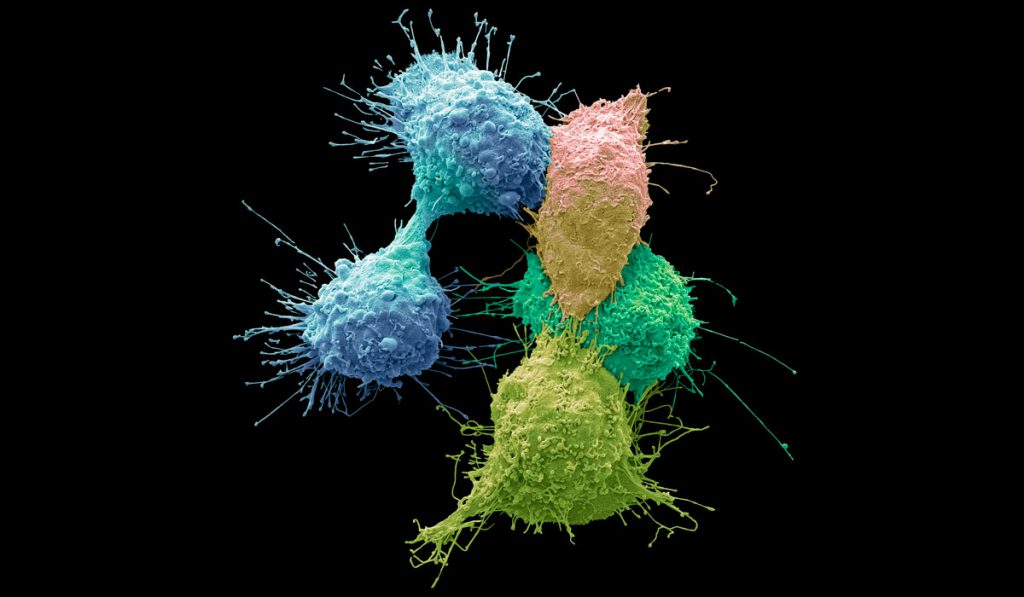New precision therapies that target the Aurora A kinase (AurA), a key regulator in mitotic cell division, are quickly becoming top priorities for cancer drug development. AurA gene amplification has been reported in breast, lung, gastroesophageal, bladder, ovary, prostate, pancreas and hematologic cancers.
Dana Cardin, M.D., assistant professor of medicine at Vanderbilt University Medical Center, helped spearhead a recent Phase 1 trial of AurA targeted therapy TAS-119 in combination with paclitaxel chemotherapy in patients with advanced solid tumors. Cardin presented a poster of the trial results during the American Society of Clinical Oncology (ASCO) 2019 Annual Meeting.
“The rationale for this trial was to determine if the AurA inhibitor TAS-119 could improve the efficacy of paclitaxel, especially in breast and ovarian cancers. In vitro and in vivo models have shown efficacy and synergistic effects when combining paclitaxel with TAS-119,” Cardin said.
A First-in-human Study
The multicenter, first in-human Phase 1 trial included patients with 15 different types of advanced solid tumors. It was designed as a dose escalation study with an expansion phase to evaluate preliminary efficacy of the recommended Phase 2 dose. Paclitaxel was administered intravenously while escalating doses of TAS-119 were given in pill form.
The median age of the patients was 62 and a majority were white. A total of 29 patients, including three in the expansion phase, were evaluable for response to the therapy. Preliminary clinical activity was seen in 66 percent of patients, including partial responses in four of the seven patients with ovarian/fallopian tube malignancies, for a response rate of 14 percent.
The toxicity profile was manageable with approximately one-quarter of patients reporting at least one treatment-related toxicity. Grade 3/4 toxicity events occurred in 34 percent of patients and there were no treatment-related deaths.
Based on these preliminary results, trial leaders determined that inhibition of the Aurora A kinase, in combination with a taxane chemotherapy like paclitaxel, could be a viable treatment option for patients with ovarian or fallopian tube cancers.
Cardin said even this small number of partial responses is encouraging since all of the patients had advanced tumors and most had been treated with several rounds of prior therapy.
The Match Game
The challenge facing cancer investigation today, Cardin says, is finding the specific molecular target driving each patient’s cancer and developing a therapy to match it. Therapies targeting the ALK mutation in lung cancer and the gene fusion known as the Philadelphia chromosome in chronic myelogenous leukemia have shown dramatic efficacy.
“We have seen in patients with some tumor types where there is a very specific mutation and a targeted drug, for that tiny subpopulation, hitting the right target makes a huge difference,” said Cardin.
“The signaling pathways that control these mechanisms are enormously complex.”
But in many cases, a single gene mutation may not be responsible for the cancer’s growth. “The signaling pathways that control these mechanisms are enormously complex, so it is overly simplistic to assume that the majority of tumors are going to have one driver mutation and if you can hit that mutation you can stop the tumor,” Cardin said.
“Even if you inhibit one molecular pathway and that works for a period of time, some of the cells will develop resistance mechanisms that will upregulate signaling mechanisms for another pathway,” Cardin added.
Cardin is joining others, including bioinformatics and oncology researchers, to analyze cancer patient data and the complex signaling pathways that underlie cancer growth. Their goal is to identify therapeutic targets that disrupt cancer signaling at multiple points, to help overcome resistance.





